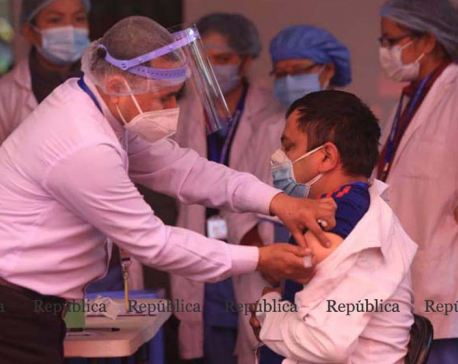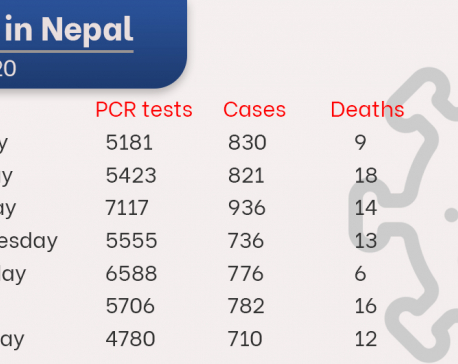
OR
Nepal’s roadmap for green recovery from Covid-19
Published On: January 10, 2021 07:10 AM NPT By: Prakash Paudel


Prakash Paudel
Prakash Paudel is a PhD candidate at Institute for Sustainable Futures, University of Technology, Sydney.news@myrepublica.com
Green recovery with social harmony and cohesion can be a utopian concept unless existing structural inequalities are addressed at the same time.
Nepal recently restated its commitment to green growth and recovery during Climate Ambition Summit and on the same day the Government of Nepal and Development Partners(DPs) agreed in a joint statement to work collaboratively for green recovery from Covid-19.
These two events can be taken as most welcoming steps for ‘build back greener’, which places climate action, clean energy, resilient infrastructures and environmental justice at the center. However, just focusing on green recovery may not be the panacea to our low-income economy, which suffers from the problem of widespread inequalities. Our priority additionally should be investing on ‘pro-poor climate resilient sectors’, which does justice to both, environment and social inequalities by creating economic opportunities to poor, who are also vulnerable to extreme effects of climate change.
In our context, ‘green recovery’ should be essentially ‘pro-poor’ for two reasons. First, Nepal’s inequality Gini Coefficient shows worse social inequality, which was 32.8 in 2010, 32.82 in 2012, 32.84 in 2013 and 39.5 in 2018 and is increasing though not steadily where indicators of such measurement are proportion of land possession, wealth concentration, access to universal basic services, (in)secure workforce, social protection, dependency on most vulnerable informal sector and gender inequality. It means we have not been able to reduce the inequality along with the economic growth.
Second, Covid-19 crisis has not only painfully exposed the inequalities in our society but has aggravated the existing inequalities. It is because those vulnerable groups have been disproportionately affected due to the loss of income and livelihood, poor social security, unequal access to basic public health services etc. So, our emphasis of such recovery should be on economic inclusion and social equality to make sure our recovery and building back better process does not happen at the cost of the poor and other vulnerable populations.
Since Development Partners (DPs) in the joint agreement have committed to align their green recovery with Nepal’s 15th Development Plan, it is high time for the government to (re)design its development strategy in a pro-poor climate resilient way, which also takes the new challenges created by the Covid into consideration. And those strategies should be nature-based solutions for growth and job creation by exploiting the abundance of natural resources, such as water, forestry, biodiversity, iconic landscapes etc.
Pro-poor resilient
The Covid-19 crisis undoubtedly could be a unique opportunity to accelerate economic recovery while prioritizing investment on clean energy sectors and green jobs by replacing carbon-intensive industries, which use fossil fuel, such as coal, petroleum, and natural gas. To work in this direction, government should redirect its investment to the climate-compatible investments, such as climate resilient infrastructure, agro-ecotourism, forest-based enterprises, renewable energy such as solar and hydropower, organic agriculture, waste-management and other resilient sectors which utilize the abundance of natural resources and create green jobs. Besides contributing to the green economy and sustainability, these sectors mostly attract the economic activities in the rural villages and economic opportunities for the poor, thus helping the societies to emerge more equal from the crisis.
For example, building and maintaining pro-poor climate resilient infrastructure, such as green roads, river training, clean energy does environment justice and creates thousands of jobs at the same time. Solar irrigation, solar mini-grid, solar arsenic water treatment plant run by community organization can produce good rural business and jobs to the people from the marginalized communities. Similarly, construction of tourism infrastructure in an eco-friendly way including waste management system, health facilities near remote tourist destination can create short-term and long-term job opportunities in the rural communities. And sustainable eco-tourism or could create over one million new jobs that support inclusive green development.
Though Nepal is one of the leading countries to run effective community forestry, Forest-based enterprises, which have potential to generate 1, 00,000 full time jobs, are underexplored. If they are promoted in the future, it can be a good source of income for poor and other vulnerable groups and at the same time contributes to better management of natural resources. Similarly, promoting organic agriculture not only creates more jobs and helps in rural development but also helps in preservation of natural environment by reducing the risk of natural disasters such as landslides, forest fires, avalanches etc. And agro-eco tourism, also helps sustainable and green rural development even during the hard times like Covid-19.
In such highly unequal societies, due to Covid-19 people have lost their jobs and livelihoods. Lack of social safety nets in this extremely difficult situation has made them more vulnerable to extreme weather events, such as flood, drought, landslides and other climate impacts that have further aggravated the existing inequalities. Thus only ‘building back better’ funds may not be enough for those communities who are impacted by such combined crisis. Increasing resilience of these doubly victimized populations to the future shocks and involving them in the process of green growth is a real challenge ahead.
In addition, government backed loans and targeted tax relief for climate-compatible investment should be specifically focused on these climate resilient sectors in post-Covid era, whereas carbon intensive industries which need the government support from recovery package should be encouraged to adopt low-carbon emissions. Governments in all levels, Development Financial Institutions (DFIs), private sector and civil society should be encouraged to invest on resilient sectors to help them emerge more equal and stronger from this crisis.
Alongside, school graduates and youths should be made fully aware about the importance of green economy by encouraging them to specialize their education on environment, such as environmental and electrical engineering, bioengineering, environmental law, environment friendly packaging and designing, environmental economy etc. If we can make this educational movement as a part of green recovery, we can better prepare workforce for future green jobs from all sections of communities.
So, we need to make sure that improved economic resilience and better environmental outcomes go hand in hand with reducing inequality, so that we can meet the sustainability goals committed in Paris Agreement and the 2030 Agenda for Sustainable Development together without dismantling the achievements we have made so far. ‘Green recovery’ with social harmony and cohesion can be a utopian concept unless existing structural inequalities are addressed at the same time.
You May Like This

Almost 29,000 frontline workers receive shot of Covishield on the second day of nationwide vaccination drive
KATHMANDU, Jan 28: Altogether 28,732 frontline workers have received a shot of ‘Covishield’ across 77 districts in the country on the second... Read More...

Nepal’s COVID-19 case tally reaches 263,193 with over 5,000 active cases
KATHMANDU, Jan 6: The total number of people infected with the novel coronavirus disease (COVID-19) has reached 263,193 with 409... Read More...

88 people succumb to COVID-19 this week, 5,591 others get infected
KATHMANDU, Dec 19: As many as 88 people have died of COVID-19 this week, taking the fatality tally of Nepal... Read More...










Just In
- Heavy rainfall likely in Bagmati and Sudurpaschim provinces
- Bangladesh protest leaders taken from hospital by police
- Challenges Confronting the New Coalition
- NRB introduces cautiously flexible measures to address ongoing slowdown in various economic sectors
- Forced Covid-19 cremations: is it too late for redemption?
- NRB to provide collateral-free loans to foreign employment seekers
- NEB to publish Grade 12 results next week
- Body handover begins; Relatives remain dissatisfied with insurance, compensation amount







Leave A Comment